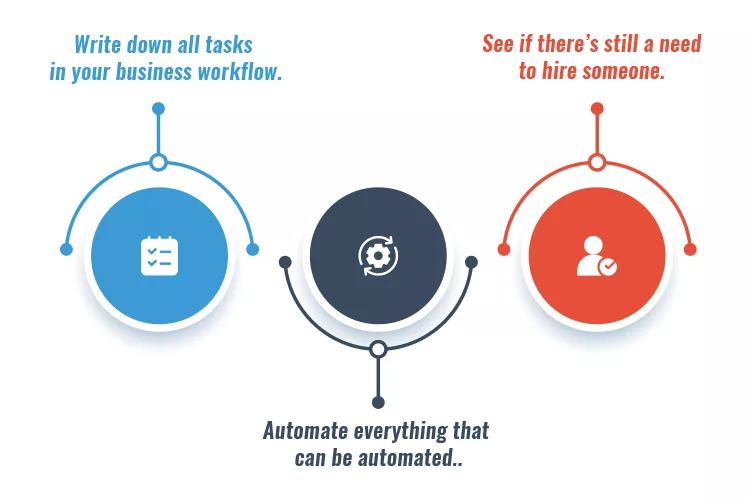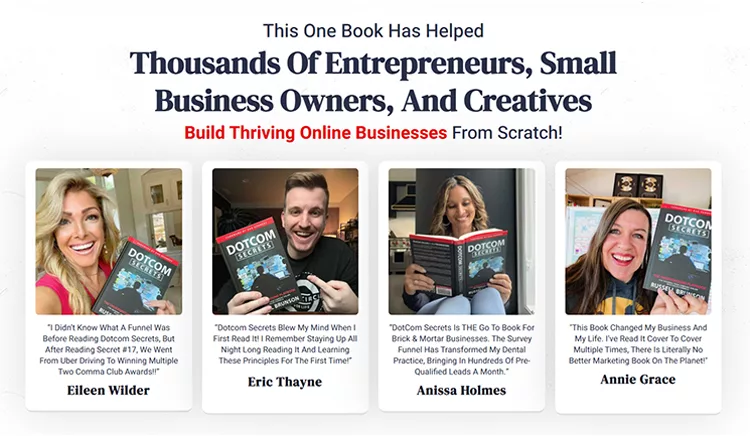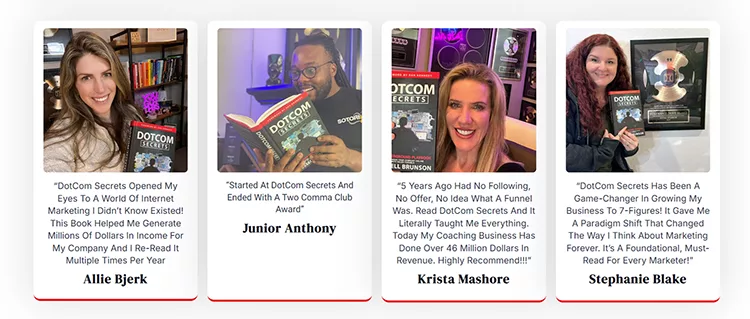Our view at Stack - ClickFunnels was founded by an online marketing legend Russell Brunson and it offers several benefits for online businesses and marketers:
- Time and Cost Savings: Efficiently create sales funnels without extensive development efforts.
- Maximized Conversions: Test offers, copy, and images to enhance conversions.
- Specific Landing Pages: Generate highly targeted landing pages.
- Predictable Pipeline: Create consistent, predictable sales paths.
- Increased Sales: On average, it boosts sales of lesser products by 15%
The post Startup Team On A Budget appeared first on ClickFunnels.
You can only go so far by yourself as a startup founder.
Eventually, you are going to reach the point where you will need to start bringing in other people in order to grow your company further.
That’s why today we want to share our guide to building a startup team with limited resources!
- Do You Want to Build a Lifestyle Business or a Unicorn Startup?
- How to Find a Good Co-Founder
- How to Hire Your First Employees
- Watch: Sam Altman’s “Team and Execution” Stanford Lecture
- Do This Before You Start Building Your Startup Team!
- Want to Learn How to Build Sales Funnels That CONVERT?
Do You Want to Build a Lifestyle Business or a Unicorn Startup?
Lifestyle Businesses vs. Unicorn Startups

The word “startup” can be used to refer to both:
- Profit-oriented businesses – where the goal of the founder is to create an income stream that brings in enough money to finance their desired lifestyle. These types of companies are sometimes called “lifestyle businesses”.
- Growth-oriented businesses – where the goal of the founder(s) is to eventually reach a billion-dollar valuation. Companies that succeed at this are known as “unicorns”.
We want to encourage you to think about which path you want to take because building a lifestyle business and building a unicorn startup requires completely different mindsets that are often at odds with each other.
This also ties into the main topic of our article because you can do the former as a solopreneur but you will definitely need a team for the latter.
Can You Make Seven Figures a Year as a Solopreneur?
You might want to explore the so-called “indie hacker” scene of software entrepreneurs who are building their startups without raising any capital.
They typically start out as solopreneurs and then either continue growing their businesses by themselves or build a small team over time.
The most prominent person in that space is Pieter Levels, whose software startups are bringing in more than $230k in monthly revenue at the time of writing, which adds up to more than $2.7M in annual revenue. You can read his book “Make” if you want to get a basic understanding of how indie hackers approach entrepreneurship.
Of course, Levels is an extreme outlier. However, looking into his story and the stories of other successful indie hackers can help you open your mind to new possibilities that you may not have considered before.
It’s possible to make six or even seven figures as a solopreneur without raising capital, building a team, or going through the Silicon Valley startup grind. So if you are not into all that and just want to have a lucrative lifestyle business, it might make sense to go the indie hacker route!
You Will Need a Team of A-Players to Build a Unicorn Startup!
However, if you want to shoot for the moon and attempt to build a billion-dollar company, you will need a team of A-players to stand a chance. That’s what we are going to focus on for the rest of this article.
Y-Combinator is one of the best-known startup accelerators in the world which has invested in more than 4,000 companies. It’s unclear what the exact number of unicorns among them is but some industry insiders estimate it to be over 100.
Having helped so many companies achieve the coveted unicorn status, Y-Combinator is uniquely qualified to advise startup founders on how to get there.
Today, Sam Altman is best known as the CEO of OpenAI, the company behind ChatGPT.
However, he began his entrepreneurial journey back in 2005, when he co-founded a startup called Loopt at the age of 19. He went on to raise $30M from several prominent investors, including Y-Combinator.
He eventually ended up joining Y-Combinator as a partner in 2011 and later became the president of this famous startup accelerator, until eventually leaving it to focus on OpenAI in 2020.
We would argue that one of the best resources out there when it comes to building a startup team is Sam Altman’s Stanford lecture called “Team and Execution”, which was a part of Y-Combinator’s “How to Start a Startup” course.
Our article is going to be primarily based on this lecture. We are going to link to it at the end in case you want to watch it!
How to Find a Good Co-Founder

Do You Even Need a Co-Founder?
Sam Altman believes that it’s better to have no co-founder than a bad co-founder.
However, only around 1 in 10 startups that Y-Combinator funds has a solo founder, presumably because they have discovered that companies that have 2-3 co-founders tend to perform the best.
What Kind of Co-Founder Do You Need?
This isn’t addressed in Altman’s lecture, but generally speaking, co-founders tend to fall into one of these two categories:
- Business co-founders that can handle marketing and sales – They tend to take on the role of the CEO.
- Technical co-founders that can handle the engineering – They tend to take on the role of the CTO.
If you don’t have either skillset then it might be worth considering that maybe you are not ready to launch a startup yet. Perhaps it would make more sense to focus on acquiring either technical or business skills instead.
Also, if you are a business person and think that you don’t need a technical co-founder because you can simply hire engineers instead, you might want to watch this video:
In it, Y-Combinator partners Michael Seibel and Dalton Caldwell explain why you need a technical co-founder and share advice on how to find one.
In his Stanford lecture, Altman touches on this as well: in his opinion, the approach of hiring engineers without having a technical co-founder doesn’t work well.
What Qualities Should You Look for in a Co-Founder?
Sam Altman argues that you want a co-founder that is smart, tough, and calm, in addition to being “relentlessly resourceful”.
He also believes that you should know your co-founder well, ideally for years prior to launching your startup.
Altman disapproves of teaming up with someone you barely know, which is apparently common among college students interested in entrepreneurship.
According to him, co-founder relationships are among the most important in the entire company. In fact, in the case of Y-Combinator, the number one cause of early startup deaths is co-founder blow-ups.
Being a solo founder is not ideal but it’s much better than co-founding a startup with some random person that you don’t know well!
Where Can You Find a Co-Founder for Your Startup?
Again, you want it to be someone you know, so you should look in your social circle.
If you don’t know anyone who would make a great co-founder, either become a solo founder or focus on expanding your personal network.
Altman suggests working for tech companies where you might meet intelligent people who are interested in entrepreneurship.
How Should You Negotiate Equity Split With Your Co-Founder?
Altman advises negotiating the equity split between co-founders as early as possible.
However, it’s not enough to split the equity, there should also be a vesting schedule so that it would be clear what will happen if one of you decides to leave.
At the time he gave his lecture, the default practice in Silicon Valley was a four-year vesting schedule where it takes four years for the founders to earn all their equity, but the clock only starts one year in so that’s five years in total.
For example, if two co-founders agree to split equity 50/50, it will take them five years to earn all of it. However, if they leave in less than a year, they get nothing.
This is designed to prevent situations where one co-founder leaves early with half the company, handicapping the remaining co-founder’s ability to raise capital due to this dead weight on the equity table.
How to Hire Your First Employees

Stay Small for as Long as Possible
Altman cautions against overhiring because the more employees you have, the higher your burn rate.
According to him, in the early days, the goal should be not to hire. You want to have as few employees as possible.
One of the reasons for that is that the cost of a bad early hire is so high: it can kill the entire company!
What Qualities Should You Look for in Early Startup Employees?
Here are the three key questions that Altman would ask himself when evaluating potential candidates:
- Are they smart?
- Do they get things done?
- Do I want to spend a lot of time around them?
In addition to that, Altman would also look for people who had good communication skills, were manically determined, and loved a little bit of risk.
As for experience, he found that its relevance was highly role-dependent. For most early hires in a startup, experience doesn’t matter much, what’s important is aptitude.
Where to Find Good Candidates When Hiring Early Startup Employees
It’s best if your early hires are people that you already know and ideally have worked with before in some capacity.
You can also ask your employees if they know someone who would be a good fit for an open position.
According to Altman, most great companies in tech have been built by personal referrals for the first 100 employees!
Spend Either 0% or 25% of Your Time on Hiring
There’s a lot of debate in the startup world on how much time founders should spend on hiring.
Altman argues that it should be either 0% of your time or 25% of your time. Meaning, you are either not hiring at all or it’s your single biggest block of time.
At first glance, this might seem excessive, but consider that it takes a lot of time to source suitable candidates, review their applications, and interview them.
In addition to that, Altman advises calling all their references and really grilling them to learn more about that person.
He also recommends giving potential hires trial projects so that you can see what it’s like to work with them.
How Much Equity Should You Give Your Early Employees?
Altman says that as a rough guideline, you should aim to give a total of 10% of your company to your first 10 employees, with a vesting schedule where they have to earn it over four years.
Learn Some Management Skills So That You Could Retain Your Employees
Altman points out that once you hire people, you then need to retain them.
This can prove to be more challenging than you initially expected. He warns that as a first-time founder, you will likely be a bad manager.
So invest some time in learning basic management skills. You need to know how to make your employees feel valued if you want to keep them happy.
Otherwise, you might end up with a high employee turnover, which can be a big problem considering how resource-intensive the hiring process is!
Fire Bad Matches FAST
It’s a terrible feeling to have to fire someone, which is why first-time founders always wait too long to do it. However, once you realize that it’s just not working, you need to let that person go.
In addition to firing employees who are bad at their jobs, you also want to fire people who create office drama, as well as those who are persistently negative.
Altman points out that keeping employees like that around creates a drag on the entire company. In fact, it can kill a startup!
Of course, we all make mistakes, we all have bad days and we all get on each other’s nerves sometimes. You shouldn’t fire someone just because they messed up once because everyone will mess up sooner or later, including you.
The “fire fast” principle is about firing people who are consistently causing problems for the company!
Watch: Sam Altman’s “Team and Execution” Stanford Lecture
Here’s the lecture:
We also highly recommend watching the entire “How to Start a Startup” lecture series on Y-Combinator’s YouTube channel!
Do This Before You Start Building Your Startup Team!

Here’s something that you might want to do before you start hiring:
- Write down all tasks in your business workflow
- Automate everything that can be automated
- See if there’s still a need to hire someone
Obviously, if you want to build a unicorn, you will need to start hiring eventually, but as Sam Altman said, in the early days, you should try not to. Automation can help you with that.
Example: Build a Sales Funnel Before You Start Hiring Salespeople
Sales funnels are systems designed to convert visitors into leads, leads into customers, and customers into repeat customers.
Before you start hiring salespeople, build a sales funnel for your product and see if you can automate it entirely. You might find that you don’t need a sales team after all!
And if complete automation is not possible, you should still automate your sales funnel as much as you can.
That way, once you start bringing in salespeople, they will be able to focus on closing sales instead of wasting time on busy work that doesn’t directly contribute to your company’s bottom line.
Keep in mind that the more streamlined your sales process, the fewer salespeople you will need to make the same amount of sales, which is important when you have limited resources!
Want to Learn How to Build Sales Funnels That CONVERT?
Our co-founder Russell Brunson used sales funnels to take ClickFunnels from zero to $100M+ in annual revenue in less than a decade.
He is now widely considered to be one of the top sales funnel experts in the world. Want to learn from him?
His best-selling book “DotCom Secrets” is the best place to start because it covers everything you need to know in order to build sales funnels that convert.
This book is available on Amazon where it has over 2,500 global ratings and a 4.7-star overall rating.
But you can also get it directly from us for free…
All we ask is that you pay for shipping!
So what are you waiting for? 🧐
Get “DotCom Secrets” for FREE!
P.S. Here’s What Readers Say About “DotCom Secrets”…


What Readers Say About “DotCom Secrets”
Thanks for reading Startup Team On A Budget which appeared first on ClickFunnels.
If Click Funnels is of interest and you'd like more information, please do make contact or take a look in more detail here.
Credit: Original article published here.
